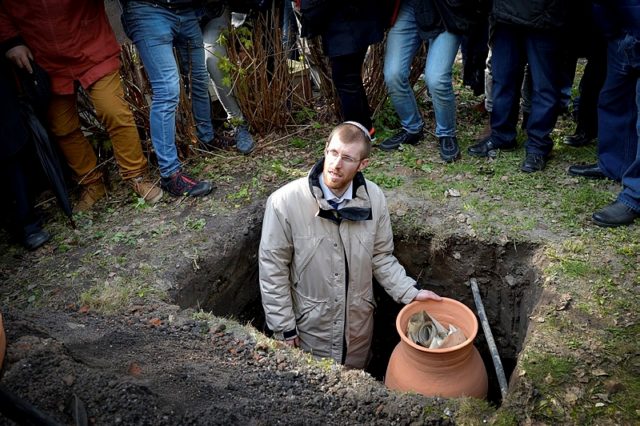Warsaw’s Jewish community buried fragments of old and damaged Torah scrolls, carrying out the ritual on the 74th anniversary of the Warsaw Ghetto uprising.
Warsaw’s Jewish community buried fragments of old and damaged Torah scrolls Wednesday, carrying out the ancient ritual on the 74th anniversary of the start of the Warsaw Ghetto uprising.
It was a symbolic celebration of life for a Jewish community that was almost completely destroyed during the Holocaust. While Warsaw had some 330,000 Jews before the war, today’s community numbers some 1,000.
“These scrolls were burned and destroyed, many of them. But the spirit of them wasn’t defeated,” Rabbi Moshe Bloom, a leader of Warsaw’s Jewish community, told those gathered on the cold April day.
“Some people’s intention was to stop the Torah learning of the Jewish nation,” Bloom said. “And here we say ‘no.’ Torah and the Jewish nation are stronger than all of these enemies.”
Large clay vessels holding the tattered fragments of dozens of Torah scrolls were then lowered into the ground by members of the community at the Warsaw Jewish Cemetery.
The holy writings, which in Jewish tradition must be buried and not destroyed when they are too damaged to be repaired, were buried next to the remains of some of the fighters from the uprising. Community leaders said nobody knew when the ritual was last carried out in Poland, and it’s possible it was the first time it had happened since the Holocaust.
Returning to a Lost Tradition
Anna Chipczynska, the head of the Warsaw Jewish community, said the event marked “a return to a tradition that had been forgotten in our community for at least 70 years.”
Earlier in the day many of same people took part in observances a few blocks away in the former ghetto to honor those who perished in the courageous revolt against the Nazi Germans who occupied Poland during World War II. They were joined by Prime Minister Beata Szydlo.
Many wore small yellow paper daffodils pinned to their clothes in a symbolic gesture of remembrance.
About 750 Jews with few arms and no military training rose up on April 19, 1943, against a powerful German force that was about to send the ghetto’s last survivors to death camps.
The revolt was crushed the following month, with the Germans razing the area to the ground and killing most of the residents.
By: AP


